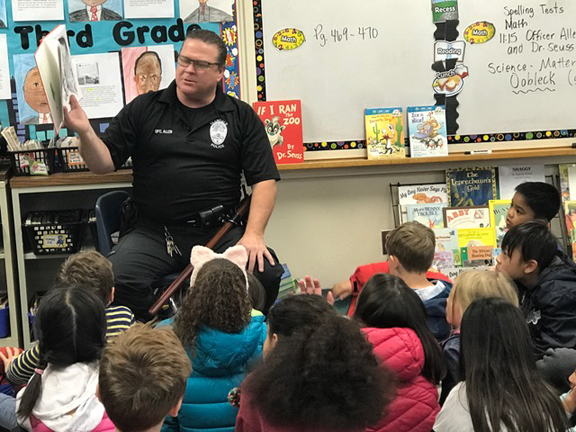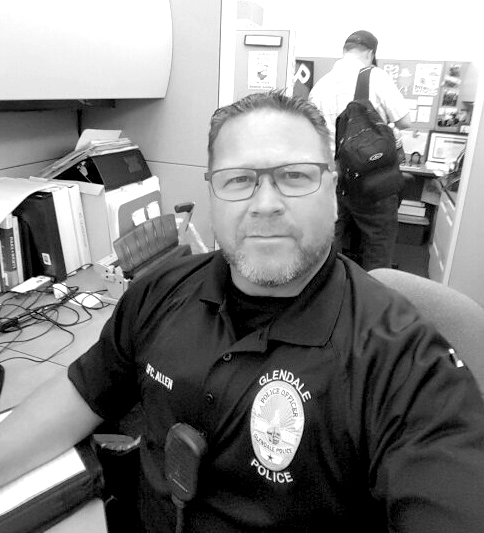
Allen, shown here reading to students in a local classroom, was involved with local youth.
By Mary O’Keefe
If Joe Allen had followed his original career plans to be an architect the Crescenta Valley community would have definitely suffered. But whatever career path he chose would have benefitted the community he called home simply because service to others is in his DNA. However, Allen chose a path in law enforcement and everyone, including hundreds of kids and families, are better for it.
Allen was born in Kentucky but was raised in Santa Monica where the mode of transportation was a skateboard and surfing was part of everyday life. His mom and dad were socially engaged, which inspired their son to get involved. He credits his parents with starting him on a course of community involvement. His dad was a councilman, a businessman and a volunteer firefighter. His mother was willing to help anyone, anywhere.
He worked at NORMS restaurant and then Kinney Shoes where he started out as a stock boy then later a salesman.
“Through [those jobs] I learned social interaction,” he said.
While attending Santa Monica College he saw an ad looking for cadets for the Santa Monica Police Dept. He volunteered four days a week with Santa Monica police parking enforcement. He then saw that Glendale police were hiring. He applied and was pre-hired in 1990. He graduated from the police academy in 1991.
He will always remember the day he was called in for a GPD interview.
“My son TJ was born at 3 that morning,” he said. “They called me in for an interview at 11 a.m.”

He worked patrol for the next eight years.
Allen has always been a unique officer, following the rules but not always in a conventional way.
“I would skateboard to work,” he said. “I was fortunate with GPD; [it] was not too small, not too big. There was a lot of camaraderie and partnership.”
He served about eight years in the Vice/Narcotics Unit. That intense work can take its toll but Allen seemed to thrive at the Unit.
“I loved it,” he said. “There was a lot of surveillance, working with informants, developing tips and information.”
The work was at times frustrating but in the end the work he did was well worth the frustration and time. And there were some real successes; he co-authored, along with Homeland Security, the first request for a wiretap in an opium case.
Being in the Vice/Narcotics Unit also allowed him to work with a number of other agencies – an essential part of networking as those who deal and use illegal drugs do not recognize city borders. Law enforcement from all agencies had to work together to share information and trends.
He worked plainclothes and undercover numerous times. He found that patrol cars were not always the best way to approach a suspect.
“I kept my skateboard in the trunk of my car as another mode of transportation,” he said. “It was very helpful.”
Whether working in narcotics, on patrol, or later as a school resource officer and community officer, Allen’s approach to law enforcement was always an outreach effort.
“I would stop and [play] basketball with kids and talk to them,” he said as a way to connect with youth.
Another part of Allen’s outreach is through his community connections. He is a founding member of the CV Drug and Alcohol Prevention Coalition, has been on the board of CVHS Prom Plus for years, is a leader at the Elks Lodge and a member of the Montrose Verdugo Chamber of Commerce – just to name a few organizations he is part of.
He was recognized by the California-Hawaii Elks Association after he was selected as the winner of the Enrique Camarena Award, both at the state and national levels. Camarena worked for the DEA [Drug Enforcement Administration] as an undercover agent in Mexico investigating a major drug cartel. In 1985 Camarena was kidnapped, tortured and murdered. His body was found a month later. Red Ribbon Week honors his memory.
Allen is also a founding member of the Fire House youth center. His connection with teens was apparent when, during the grand opening, he played a game of pool with a teen he had previously cited for curfew violation. He was able to have frank conversations with teens that made them feel they were not being talked at but spoken with.
In another incident, a teen had a parent who was having some obvious mental health issues. The teen was scared but also embarrassed and didn’t want to reach out to anyone for help, including teachers, spiritual leaders, or counselors. But when Allen’s name was mentioned, the teen said, “Joe. Yeah, okay if it’s Joe.”
Allen then assisted the family in getting the help they needed.
“Our youth will do their best when they have direction, oversight and hope,” he said.
Allen has been traveling the country training officers, educators and community members on narcotics issues. He will be continuing that education outreach as he moves into retirement.
He has raised his children in Crescenta Valley/Glendale and plans to stay in the community.
“It takes a community to keep it safe,” he said.
He is ready for retirement – ready to see where life takes him, and reflective on his career.
“I want people to say that I treated them fairly,” he said.
Recently, he was at the Glendale police firing range taking his retirement test – the test that qualifies him to carry his police weapon even though he’s retired. The range is located near the Scholl Canyon Athletic Field.
“As I was driving away two women were walking their dogs on the street. They waved and said, ‘Thank you for your service.’ I thought that was a fitting reminder of my 32 years in law enforcement,” he said.
